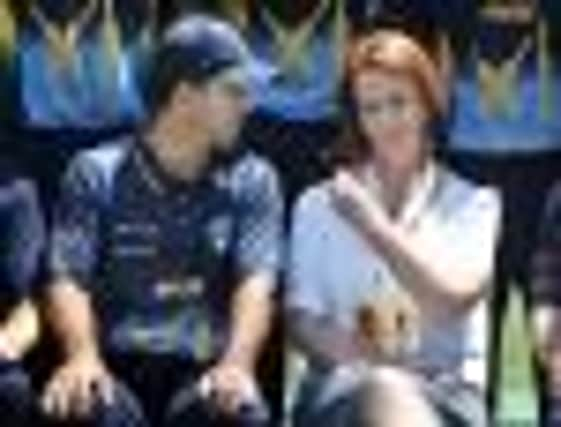Gillard stuns Australia by announcing election date


Elections must be held in Australia by the end of the year, but Ms Gillard said yesterday she wanted to end political uncertainty by setting the date now.
“It is not right for Australians to be forced into a guessing game,” she said. “So, in the interests of certainty, in the interest of transparency, in the interest of good governance, I have made the date clear.”
Advertisement
Hide AdAdvertisement
Hide AdMs Gillard’s minority Labour government holds a one-seat majority with support from independents and the Greens, and polls suggest the Liberal opposition would easily win office if an election were held now.
The election will decide whether Australia keeps its controversial carbon tax, and a 30 per cent tax on coal and iron ore mining profits, which the conservative opposition has promised to scrap it if wins power. Apart from these two policy differences, the government and opposition differ little on domestic issues, and both firmly support greater involvement with China, the country’s biggest trade partner.
Ms Gillard said the governor-general would dissolve parliament on 12 August, giving the government two more sessions to pass laws and deliver its May budget.
She used the speech to the National Press Club to lay the groundwork for an election-year battle focused on the economy, arguing that a strong economy is necessary to ensure fairness in education and disability services – two key election policies aimed at Labour heartland voters. Australia’s resource-driven economy is expected to slow this year as a stubbornly high currency crimps export earnings and a boom in mining investment plateaus. The economy has grown for the past 22 years and has overtaken Spain as the world’s 12th largest economy.
Australian governments serve three-year terms and the prime minister has the right to decide the election date. By calling a September election, Ms Gillard’s government will have served a full term. She said she did not want her announcement to mark the start of an eight-month election campaign.
“I do so not to start the nation’s longest election campaign – quite the opposite,” she said. “It should be clear to all which are the days of governing and which are the days of campaigning. Announcing the election date now enables individuals and business, investors and consumers to plan their year.”
Meanwhile, WikiLeaks founder Julian Assange indicated he would run for a seat in the Australian senate in the vote.
His mother, Christine Assange confirmed her son’s candidacy yesterday after WikiLeaks tweeted the news. “He will be awesome,” she said. “In the House of Representatives, we get to choose between US lackey party No1 and US lackey party No2 – between the major parties. So, it will be great to ‘Assange’ the Senate for some Aussie oversight.”
Advertisement
Hide AdAdvertisement
Hide AdQueensland-born Mr Assange, who founded the secret-leaking website WikiLeaks, announced his ambition to sit in Australia’s upper house Senate last December from Ecuador’s London embassy. He sought refuge there last June in an attempt to avoid extradition to Sweden.
Mr Assange fears if he goes to Sweden to be questioned over rape allegations, authorities will allow him to be extradited to the US to be questioned over WikiLeaks’ release of thousands of American diplomatic cables. To run for the senate, Mr Assange must get the signatures of 500 eligible Australian voters. If he were elected while still out of the country, WikiLeaks said a nominee would occupy the seat.
It was unclear whether being elected a senator would have any bearing on his status in Britain and whether he would be allowed to leave the country of his own accord.